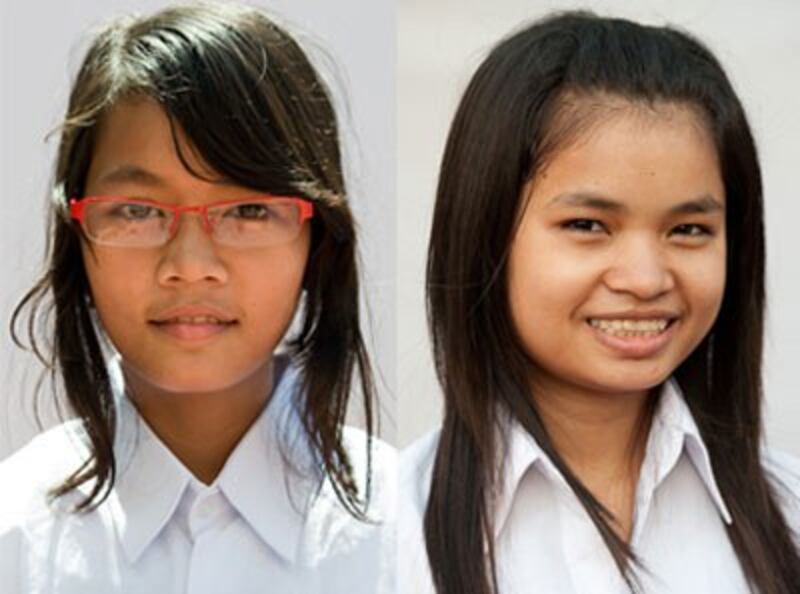Two Cambodian teenagers who had formerly scavenged the garbage dumps of Phnom Penh have reversed their fortunes and were honored with a visit to the White House to meet with First Lady Michelle Obama on International Women’s Day.
Chen Sokha, 16, and Oun Sreyna, 18, were notified of the surprise invitation to the U.S. president's mansion while preparing to take part in a women’s conference with the Chicago-based A New Day Cambodia (ANDC), a non-governmental organization supporting their education.
Chen Sokha was orphaned in Svay Rieng province at the age of six and forced to scavenge for recyclable materials after moving to the Cambodian capital.
She labored in Phnom Penh’s Stung Meanchey garbage dump for a few cents a day until she was rescued by ANDC in 2007.
These days, Chen Sokha studies English and mathematics in the sixth grade at the ADNC center in Phnom Penh.
Chen Sokha was recently selected as the Cambodian representative for a documentary entitled “10X10” about educating 10 girls in 10 countries around the world. Her participation in the film had caught the attention of the Women of the World Summit organizers, who invited her to the U.S. to attend the conference.
It was during a stop at the ANDC headquarters ahead of the summit that she was notified of her invitation to the White House. According to Annette Jensen, executive director of ANDC, the two girls were asked to meet the First Lady because of their participation in the conference.
“I was speechless when I met her—First Lady Michelle Obama—because I was extremely excited. I never thought in my life that I would be able to meet her, so I nearly cried,” she said.
‘I was so excited’

Oun Sreyna, who now attends Norton University in Phnom Penh as a first year student with her older sister, said the chance to visit the United States was something she never would have imagined when she was rescued from the Stung Meanchey dump eight years ago.
“Initially, I did not realize that I would able to visit the U.S. When I was asked by the organizer to take a picture for a visa application, I was surprised and wondered, ‘Where am I going?’ Then she told me that I was being invited along with Sokha.”
Once in the United States, Oun Sreyna said she received the other surprise news—an invitation to meet with the First Lady.
“I was so excited, but I did not know what I should say when I met her, because [U.S. customs are] so different from Cambodia,” she said of the International Women’s Day event, which also included several other teenage girls from around the world.
“We were standing in line when First Lady Michelle Obama came out and shook hands with us. She met and spoke in a friendly manner with us one by one.”
Oun Sreyna said that despite her nervousness, she managed to speak to Michelle Obama and present her with two Khmer silk scarves, one on behalf of Chen Sokha.
“She thanked us and said she was so happy to receive the gifts. I told her that I was very excited to be able to meet her—especially when she hugged me.”
Perils of scavenging
The Stung Meanchey garbage dump was closed by the Cambodian government in 2009 and reopened as Choeung Ek Dump further outside of Phnom Penh.
But children from impoverished families still scavenge the site for plastics, glass, tin cans, and other recyclable goods to sell, hoping to earn as much as U.S. $10 a month.
Dangers abound in the dumps for children who pick through the toxic heaps of trash, often barefoot and shirtless.
The waste is damp and unstable and bulldozers rumble through the site throughout the day. Children show up at local clinics suffering from bruises, rashes, and cuts, while others who are not so lucky have been crushed under the machines and the heavy bins they drop off at the dump.
While it is illegal in Cambodia for children under the age of 18 to perform such treacherous work, the law goes largely unenforced.
Solving the problem of the dumps will not be easy—by locking scavengers out, the government would be denying them a living wage, but allowing them to continue puts their lives at risk.
Reported by Naline Pea for RFA’s Khmer service. Translated by Chivita. Written in English by Joshua Lipes.
